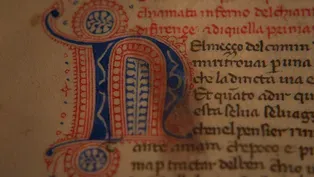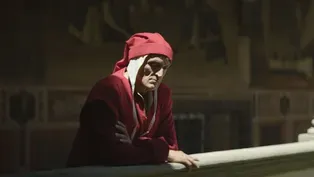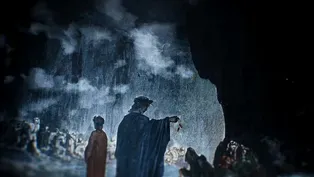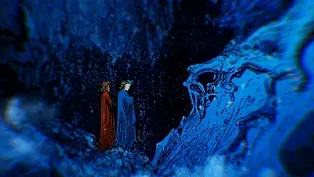
Crisis of Exile
Clip: Episode 1 | 5m 53sVideo has Closed Captions
Explore how Dante's exile from Florence influenced and motivated his work.
Explore the despair and anger Dante felt after being unjustly exiled from Florence, and how his exile and the death of Beatrice Portinari motivated his writing — and ultimately the creation of The Divine Comedy.
Problems with Closed Captions? Closed Captioning Feedback
Problems with Closed Captions? Closed Captioning Feedback
Funding for DANTE: INFERNO TO PARADISE was provided by Rosalind P. Walter; the National Endowment for the Humanities; the Corporation for Public Broadcasting; the George Jenkins Foundation; Dana and Virginia...

Crisis of Exile
Clip: Episode 1 | 5m 53sVideo has Closed Captions
Explore the despair and anger Dante felt after being unjustly exiled from Florence, and how his exile and the death of Beatrice Portinari motivated his writing — and ultimately the creation of The Divine Comedy.
Problems with Closed Captions? Closed Captioning Feedback
How to Watch Dante: Inferno to Paradise
Dante: Inferno to Paradise is available to stream on pbs.org and the free PBS App, available on iPhone, Apple TV, Android TV, Android smartphones, Amazon Fire TV, Amazon Fire Tablet, Roku, Samsung Smart TV, and Vizio.
Buy Now
Providing Support for PBS.org
Learn Moreabout PBS online sponsorshipCachey: The whole project of the poem emerges from the wound of the exile and his reputation that has been ruined by this unjust banishment from his city.
He's alone.
He's in danger.
He can be killed by anybody out of Florence.
He's supposed to be hanged or burned if he goes back to Florence.
Narrator: Dante wrenched his inimitable masterpiece into existence at a moment of supreme crisis and change, not only for himself but for the wider world generally as the feudal structures of the Middle Ages began to give way and a new modern world loomed into view, a world in which every aspect of the moral, political, social, religious, and economic order seemed to be changing and breaking apart and nowhere more so than in Florence itself, a city long possessed, as Dante well knew, by at once the loftiest and the basest, the most creative and destructive human instincts and impulses.
Woman: The poem emerges from this moment of profound crisis.
There's a political crisis at hand, intense never-ending conflict and fragmentation, and Dante really believes that we're close to end times.
There's the real urgency of now, this moment, in which we have to act now.
Man: Dante is faced with corruption, he's faced with sinning, he's faced with violence on the part of human beings against other human beings, and his reaction is not to accept that, but it's actually to portray, to depict it, and to show there is another way.
Man: The idea that one would write a hundred cantos essentially about one's own spiritual journey, turning one's personal life into the model for all humanity, it's an act of huge arrogance and of huge ambition, and at the same time, Dante is trying to say that this is possible for everyone.
Pertile: After all, the purpose of Dante's major work, the "Comedy," is to change the world... and the purpose of showing the conditions of the damned in "Inferno" or the conditions of the purging souls in "Purgatory" or even the conditions of the blessed in "Paradise" is for us, for human beings, to reform ourselves and our lives.
Dante means it.
Dante means what he writes.
It is not a game.
♪ Narrator: For Dante himself, the experience of exile and of crafting the monumental poem would transform him utterly, exerting a powerfully centrifugal, ever-widening impact on his life, on his work, and on the vast posterity of readers he was determined the great poem would speak to.
Lombardi: You think about the exile, and you think about all the hardships of what happened to him, the people that he was exposed to and the languages and the stories.
All he has, his very life, is consigned to this work, and he's putting it, in a way, on the line of writing and reading, and it's extraordinary.
Woman: He might have died along the way.
As he says at the beginning of "Paradiso" XXV, "this poem that made me macro," that wore me out, that consumed me, and there is a way in which you feel that that work-- he took it to the end of his life, and it was consuming.
Narrator: At the very heart of Dante's extraordinary poem, propelling it onward from beginning to end would be two powerful forces: the violently bitter hatred, factionalism, corruption, and greed of his native city, which he longed to heal; and his love for an ineffably beautiful woman named Beatrice, a Florentine girl he had met in childhood, who had died when she was 24, whom he would write passionately about all his life and to whom he longed somehow to find a way to return.
♪ Pertile: One of the reasons why Dante writes this magnificent poem is to provide himself with a passport back to his home, to his beloved home, Florence, but the more he writes, the bigger the separation becomes, the bigger the difference becomes between him and Florence.
Man: I don't think that the poem would have had its kind of power had he managed to stay in Florence.
He also might not have written it or not written it in the same way if he were not in exile from Florence.
In some ways, the poem becomes the homeland for him that the city is not.
He actually creates in the poem his own home.
♪
Video has Closed Captions
Discover Dante's motivation for writing and the power of The Divine Comedy. (2m 42s)
Video has Closed Captions
See medieval Florence from 1216 to Dante's birth in 1265, his child, education and more. (30s)
Video has Closed Captions
Dante and Virgil descend to the Third Circle of Hell where they encounter those condemned. (4m 28s)
Video has Closed Captions
Dante and Virgil begin their descent into Inferno, through the Gates of Hell. (2m 49s)
Providing Support for PBS.org
Learn Moreabout PBS online sponsorshipSupport for PBS provided by:
Funding for DANTE: INFERNO TO PARADISE was provided by Rosalind P. Walter; the National Endowment for the Humanities; the Corporation for Public Broadcasting; the George Jenkins Foundation; Dana and Virginia...
















